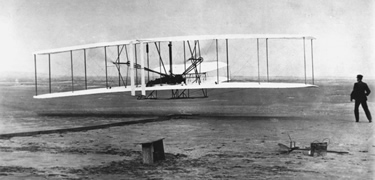

 The Accurate Reloading Forums
The Accurate Reloading Forums  THE ACCURATE RELOADING.COM FORUMS
THE ACCURATE RELOADING.COM FORUMS  Other Topics
Other Topics  Aviation
Aviation  Why little post ww2 use of Allisons?
Why little post ww2 use of Allisons?Go  | New  | Find  | Notify  | Tools  | Reply  |  |
| one of us |
https://www.youtube.com/watch?v=HLc1z0yOXCw Radials ruled after the war. They were plentiful and available powering all significant airliners of the day. Allisons were plentiful too. "In total, 69,305 V-1710s were built by Allison during the war.....". (Wikipedia). The question is: Why weren't more civilian aircraft equipped with Allisons? Or other LC engines like the Merlin. Testing of radial replacement with Allison engines in a few aircraft indicated higher speeds could be attained with lower HP due mainly to drag reduction. The Canadians had the Northstar. A version of the DC4 equipped with Merlins. it was a full 100 MPH faster than the radial engined DC4. A problem with it was noise created by the Merlin exhaust stacks that was partially addressed with cross-over pipes. "Glacier Girl" P-38 Lightning compared to the P47 in the above link is a video that illustrates how quiet the Allison engined P38 is compared to the radial. This due in large part to the P-38 exhausting thru the turbo. If you close your eyes and listen to the audio, it sounds like a turbo-prop. The main noise created by the props and wind rushing over the fuselage. So what was the reason? TBO's, specific fuel consumption, maintenance , other. Certainly not availability. | ||
|
| one of us |
Interesting question. Here's a not-very-good YouTube on the Northstar. https://www.youtube.com/watch?v=Czoj_z-kcbg There is hope, even when your brain tells you there isn’t. – John Green, author | |||
|
| One of Us |
https://www.youtube.com/watch?v=z5P77VrRmaA Dont forget about the great De Havilland Mosquito | |||
|
| one of us |
Yes, the Brits ran Lancastrians and the Canadians ran Northstars with Merlins. They both were profitable. Wartime Merlins had a 400 hr TBO and Allisons had between a 500 hr and a 1,000 hr TBO depending on usage parameters. But these were combat TBO's. In commercial use,the engines would not have been operated at high boost and with water/methanol injection. Moreover, wartime engines were built to looser tolerences than commercial. This due to facilitate fitting in mass prouction and the fact that most engines would not last more then 200 hrs in combat. The causes being the airfrme would be worn out, engine blown, or the craft would be lost. If re-manufactured to commercial tolerances, the TBO's could be extended far beyond 1,000 hrs. So, for regianal airlines, that would mean an overhaul/changeout every 6-12 months depending on usage. I figure about 1,500-2,000 hrs. That's equivalent to driving a car for around 100,000 miles.
| |||
|
| one of us |
Gulfstream G1's were equipped with Rolls Royce Dart turbo props. 2,100 hp, the same as the Allison 1710. It would be neat to see a conversion performance comparison. | |||
|
| One of Us |
I believe that a lot of the surplus Allison's were used in Hydrofoils | |||
|
| One of Us |
You mean hydroplanes? Yes but Merlin’s became the choice for many years because they were faster. Griffin’s even more so. The move to turbine power plants in the beginning was due to the increasing scarcity of engine blocks to build on for hydroplane racing. Roger ___________________________ I'm a trophy hunter - until something better comes along. *we band of 45-70ers* | |||
|
One of Us |
The big Allison/Merlin/Radial piston engine market killer was the invention of the turbo-prop engine. Much higher power and reliability than any piston engine. Hard to argue with a spinning engine vs any reciprocating engine. From an economic standpoint, until recently there have not been cost effective turbine engines under 317hp. | |||
|
| one of us |
Hmmm...what engine did E J Potter use in the Dart? TomP Our country, right or wrong. When right, to be kept right, when wrong to be put right. Carl Schurz (1829 - 1906) | |||
|
| One of Us |
I know this thread is old, but I known where the Allisons went. Hallibuton and Dowell used them in the first generation of hydraulic fracturing pumpers. They gave 1,000 hydraulic horsepower in a tandem truck weight legal package. They were so cheap, that they were not rebuilt, but replaced when you blew an engine. Dowell used Solar turbines in frac pumpers in the 1970s in an effort to maintain 1,000 HHp in a tandem truck package. I got to work on Dowell's last Allison in Kellyville, OK. They were trying to start a company museum, but it didn't work out. | |||
|
| one of us |
Thank you for that information. I also recently discovered that Allisons had a 300 hr TBO in aircraft installations which would have likely been the reason there. Radials at that time were going 2,000 hrs.
| |||
|
| Powered by Social Strata |
| Please Wait. Your request is being processed... |
|
 The Accurate Reloading Forums
The Accurate Reloading Forums  THE ACCURATE RELOADING.COM FORUMS
THE ACCURATE RELOADING.COM FORUMS  Other Topics
Other Topics  Aviation
Aviation  Why little post ww2 use of Allisons?
Why little post ww2 use of Allisons?

Visit our on-line store for AR Memorabilia

